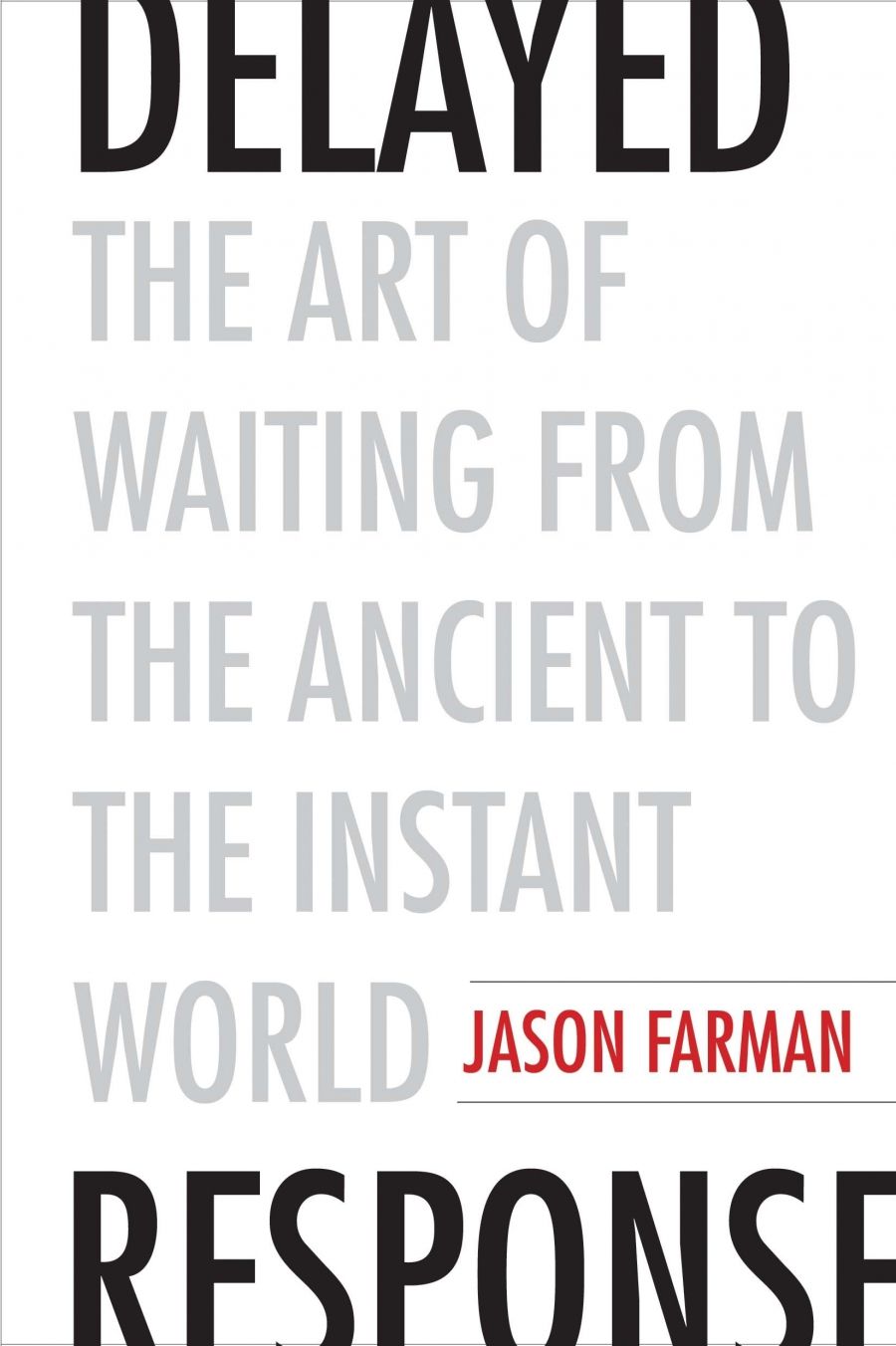
- Free Article: No
- Contents Category: Commentary
- Custom Article Title: Alex Tighe reviews <em>Delayed Response: The art of waiting from the ancient to the instant world</em> by Jason Farman
- Review Article: Yes
- Custom Highlight Text:
‘A book about waiting’ was perhaps a hard sell for Jason Farman to make to his publisher. Waiting, so the consensus goes, sucks. It is the elephant graveyard of time, the dead zone between something and something else. Who would want to spend more time on waiting? It helps to clarify that Delayed Response is not ...
- Book 1 Title: Delayed Response: The art of waiting from the ancient to the instant world
- Book 1 Biblio: Yale University Press (Footprint), $39.99 hb, 217 pp, 9780300225679
All of which sounds quite abstract; Delayed Response is anything but. Farman dispenses the theory through stories – about pneumatic tubes and the American Civil War and a performance of Waiting for Godot in a prison. Across these stories, Farman’s abiding interest is in the way that the speed of communication alters the felt quality of time. If waiting ‘breaks’ time and makes it visible to the individual, technology has the ability to make time disappear.
Here’s something you’ve done: in a bored moment, you’ve opened your phone, flicked through your apps, and then closed your phone again without doing anything on it. When the Apple Watch was released, the satirical news website The Shovel published a piece titled ‘Human Life Now Entirely Taken Up with Checking Things’, which featured an interview with a woman relieved that she now had something to look at between checking her smartphone and checking it again. Our devices plug the gaps between stimulation, and when our attention is occupied time slipstreams away, inconspicuous.
Does anybody actually want this? For the tech companies, the benefits of the elimination of waiting are enormous. It is already well documented that the longer our screens can hold our attention, the more money tech companies can make selling that attention to advertisers. A less obvious fact that Farman highlights is the way that tiny delays have massive effects on tech companies’ profits: on the Amazon website, a uniform delay of one-tenth of a second causes Amazon to lose one per cent of its revenue. Likewise, Google did a study where an extra half-second of waiting caused their traffic to drop twenty per cent.
We’re told that waiting is bad for individuals, too – don’t you know that waiting sucks? – and that the acceleration of technology is in our best interests. Farman likens this perception to something like a modern religious tenet: ‘The mythologies of the digital age center around the idea that waiting is keeping you from obtaining what you want and holding you back from living a more fulfilling and productive life.’ Written out like that, it’s easy to see the false equivalence between ‘fulfilment’ and ‘productivity’. (Roughly, fulfilment is found in doing things that have meaning to you, while productivity is doing things that have value to other people.) Yet the idea of productivity being an axiomatic good has passed into the collective unconscious. It shouldn’t have; productivity is good only if it is directed towards some good ends. Productivity for its own sake is morally indistinguishable from waste.
The paradox of the digital age has always been the question of how the tools of massively increased efficiency have the effect of making us feel like we have less time, not more. Delayed Response, with its extended focus on time and technology, can be read as an untangling of this paradox. Time is valuable – it’s just we’re not always the ones who get the most value out of it.
Farman is an excellent writer, and Delayed Response rarely reads academically (Farman works as a media scholar at the University of Maryland). In one chapter he travels from Baltimore to Melbourne to study Aboriginal message sticks, and he gives this elegant description of his first day: ‘The train car was full, and the day was bright and sunny, the weather almost perfectly matching the temperature back in Maryland, just swapping out the spring buds on Washington’s cherry trees for yellow leaves falling along Melbourne’s laneways.’
It is the strength of Farman’s storytelling that makes the book cohere. There’s a lot happening in Delayed Response (including a wonderfully geeky chapter on buffering icons); I suspect the scope of the book’s thinking developed in the writing. Not that that’s a problem; indeed, one of the book’s pleasures is the constant delight of unexpected information.
Delayed Response is an original contribution to the growing genre of books that want us to be more conscious of our relationships, collectively and individually, with technology – not only with technology, but with the passage of time itself. Reading Delayed Response, I was reminded of the narrator from Julian Barnes’s The Sense of an Ending: ‘We live in time – it holds us and molds us – but I never felt I understood it very well.’ The narrator could start with Farman’s book. In terms of ways to use the hours, he could do much worse.


Comments powered by CComment